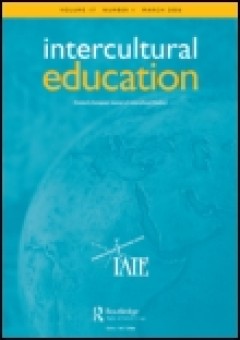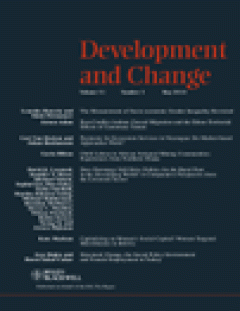Filter by

Intercultural development in the Romanian school system
The present paper aims to briefly describe the manner in which intercultural education is perceived in the Romanian school system, as well as the solutions that are being proposed (mainly in the form of activities) for reconsidering and strengthening interculturality as a dimension of education. We report on the results of semi-structured questionnaires, a survey, and several case studies.
- Edition
- Volume 21, Issue 4 August 2010 , pages 329 - 339
- ISBN/ISSN
- 14675986
- Collation
- -
- Series Title
- Intercultural Education
- Call Number
- -

The effects of the 'Welcome Schools' Program in Madrid, Spain: an ethnographi…
The aim of this paper is to share the conclusions of a recent ethnographic study carried out in Madrid from 2005 to 2008 to analyze the effects of a program implemented by the Community of Madrid, Spain, to address diversity in schools. The Program was given an English name - 'Welcome Schools' - and was aimed at preparing children recently arrived from outside Spain for entry into the regular s…
- Edition
- Volume 21, Issue 4 August 2010 , pages 341 - 350
- ISBN/ISSN
- 14675986
- Collation
- -
- Series Title
- Intercultural Education
- Call Number
- -

Heuristic reasoning and beliefs on immigration: an approach to an intercultur…
People use mental shortcuts to simplify the amount of information they receive from the environment. Heuristic reasoning can be included among these mental shortcuts. In general, heuristics is useful for making fast decisions and judgements, but in certain cases, it may lead to systematic errors because some relevant aspects presented in the given information are ignored. Heuristic reasoning is…
- Edition
- Volume 21, Issue 4 August 2010 , pages 351 - 364
- ISBN/ISSN
- 14675986
- Collation
- -
- Series Title
- Intercultural Education
- Call Number
- -

Language learner/native speaker interactions: exploring adaptability in inter…
Diversity and intercultural awareness initiatives are increasingly common at institutions of higher education in the USA. Although students recognize and appreciate the diversity of their surroundings, studies show that intercultural interactions at the social level are lacking. This study focuses on how English language learners, multilingual students, and monolingual students of English perce…
- Edition
- Volume 21, Issue 4 August 2010 , pages 365 - 377
- ISBN/ISSN
- 14675986
- Collation
- -
- Series Title
- Intercultural Education
- Call Number
- -

Tuning frequencies of multicultural education objectives to distinct society …
Through a qualitative approach of narrative inquiry, this paper examines how Queacutebec's distinct society identity interacted with objectives of a Multicultural Education course in Montreal. The authors, one of whom was a teaching assistant in the course and the other a student in the course, interviewed seven students and the professor. The reasonable accommodation debates on how best to int…
- Edition
- Volume 21, Issue 4 August 2010 , pages 379 - 394
- ISBN/ISSN
- 14675986
- Collation
- -
- Series Title
- Intercultural Education
- Call Number
- -

“I Feel Like It’s a Heavier Burden. . .”: The Gendered Contours of Hete…
One of the explicit goals of the 1996 welfare reform in the United States was to create conditions that would encourage marriage as a means of reducing poverty and welfare �dependency.� With the exception of a few notable studies that examine reliance on abusive partners and former partners, relatively little scholarly attention has been given to the contours of partnering after welfare reform.…
- Edition
- Vol. 24 no. 5, October 2010.pp. 565-590
- ISBN/ISSN
- 08912432
- Collation
- -
- Series Title
- Gender & Society
- Call Number
- -

Caring About Food: Doing Gender in the Foodie Kitchen
This article draws on interviews with �foodies��people with a passion for eating and learning about food�to explore questions of gender and foodie culture. The analysis suggests that while this culture is by no means gender-neutral, foodies are enacting gender in ways that warrant closer inspection. This article puts forward new empirical findings about gender and food and employs the concept o…
- Edition
- Vol. 24 no. 5, September 2010.pp. 591-615
- ISBN/ISSN
- 08912432
- Collation
- -
- Series Title
- Gender & Society
- Call Number
- -

Normative Discrimination and the Motherhood Penalty
This research proposes and tests a new theoretical mechanism to account for a portion of the motherhood penalty in wages and related labor market outcomes. At least a portion of this penalty is attributable to discrimination based on the assumption that mothers are less competent and committed than other types of workers. But what happens when mothers definitively prove their competence and com…
- Edition
- Vol. 24 no. 5, September 2010,pp. 616-646
- ISBN/ISSN
- 08912432
- Collation
- -
- Series Title
- Gender & Society
- Call Number
- -

Gender, Care Work, and the Complexity of Family Membership in Japan
This research investigates sociological ambivalence in negotiating care work in Japanese families. Women and their aging parents experience ambivalence based on conflicting norms of filial obligation, gender ideology, and cultural beliefs about the parent�child bond. Analysis of in-depth interview data showed ambivalence was based on (1) conflict between norms and cultural beliefs and (2) inter…
- Edition
- Vol. 24 no. 5, September 2010.pp. 647-671
- ISBN/ISSN
- 08912432
- Collation
- -
- Series Title
- Gender & Society
- Call Number
- -

“I Feel as if I Am the One Who Is Disabled”: The Emotional Impact of Chan…
Despite the 1970s middle-class feminist dream that women could have it all�families characterized by equitable distributions of household labor and interesting careers�the decades since have told a different story. In the U.S. context of a neoliberal labor market and privatized systems of family care, mothers still struggle to negotiate the conflicting demands of family and employment, particul…
- Edition
- Vol. 24 no. 5, October 2010 .pp. 672-696
- ISBN/ISSN
- 08912432
- Collation
- -
- Series Title
- Gender & Society
- Call Number
- -

Negotiating Statehood: Dynamics of Power and Domination in Africa
This article, which forms the introduction to a collection of studies, focuses on processes of state construction and deconstruction in contemporary Africa. Its objective is to better understand how local, national and transnational actors forge and remake the state through processes of negotiation, contestation and bricolage. Following a critique of the predominant state failure literature and…
- Edition
- Volume 41, Issue 4, July 2010, pages 539–562
- ISBN/ISSN
- 0012155x
- Collation
- -
- Series Title
- Development and Change
- Call Number
- -

Protection for Sale? War and the Transformation of Regulation on the Congo–…
This article proposes an explanation for the emergence of non-state governance in situations of apparent state collapse, based on an ethnographic study of the armed rebellion in Butembo (eastern Democratic Republic of Congo). The model of explanation is inspired by Charles Tilly's description of state making as organized crime, in which armed rebels and private economic agents enter an agreemen…
- Edition
- Volume 41, Issue 4, July 2010, pages 563–587
- ISBN/ISSN
- 0012155x
- Collation
- -
- Series Title
- Development and Change
- Call Number
- -

Modeling Nonprofit Employment: Why Do So Many Lesbians and Gay Men Work for N…
Why are people with same-sex partners more likely than married people to work for nonprofit organizations (NPOs)? Analysis of 2000 Census data suggests that smaller gay�straight pay disparities for men in the nonprofit sector, occupational choices, and ability to afford nonprofit employment explain some overrepresentation of partnered gay men but not of partnered lesbians. Even after controllin…
- Edition
- Vol. 42 no. 6, October 2010.pp. 720-748
- ISBN/ISSN
- 00953997
- Collation
- -
- Series Title
- Administration & Society
- Call Number
- -

The Struggle Continues? The Spectre of Liberation, Memory Politics and ‘War…
Memory politics continues to define the socio-political landscape of post-colonial Namibia. Interpretations of the country's recent political history are used to contest and legitimize current social and political relations. This article examines these issues as they appear in the negotiation of recognition and benefits between ex-combatants and state and ruling party actors. A dominant narrati…
- Edition
- Volume 41, Issue 4, July 2010, pages 589–613
- ISBN/ISSN
- 0012155x
- Collation
- -
- Series Title
- Development and Change
- Call Number
- -

Federal Restructuring in Ethiopia: Renegotiating Identity and Borders along t…
When the Ethiopian state was reorganized as an ethnic federation in the 1990s, both ethnicity and governance experienced the impact of the change. Most importantly, ethnicity became the key instrument regarding entitlement, representation and state organization. For the larger ethnic groups, fitting into the new ethno-federal structure has been relatively straightforward. In contrast, ethnic fe…
- Edition
- Volume 41, Issue 4, July 2010, pages 615–635
- ISBN/ISSN
- 0012155x
- Collation
- -
- Series Title
- Development and Change
- Call Number
- -

Facing Up to the Centre: The Emergence of Regional Elite Associations in Ango…
This article compares two regional elite associations in Angola's southern Hu�la province � the?Associa��o dos Naturais e Amigos de Kuvango, Jamba e Chipindo (Anakujachi � Association of Natives and Friends of Kuvango, Jamba and Chipindo) and the?Associa��o Solidariedade Nyaneka-Humbi (SNH � Nyaneka-Humbi Solidarity Association). It demonstrates how these associations have gained increasing pol…
- Edition
- Volume 41, Issue 4, July 2010, pages 637–658
- ISBN/ISSN
- 0012155x
- Collation
- -
- Series Title
- Development and Change
- Call Number
- -

The People, the Power and the Public Service: Political Identification during…
In francophone West Africa, the term?fonctionnaire unambiguously identifies public servants as integral parts of the state apparatus. Yet during general strikes in Guinea in 2006/7 this self-evident association was called into question by the polarization of the public discourse which forced Guineans into associating either with the state or with the protesting people. Based on empirical data f…
- Edition
- Volume 41, Issue 4, July 2010. pages 659–677
- ISBN/ISSN
- 0012155x
- Collation
- -
- Series Title
- Development and Change
- Call Number
- -

The Party and the State: Frelimo and Social Stratification in Post-socialist …
This contribution examines the relationship between the ruling Frelimo party and the state it controls in post-socialist Mozambique. It argues that while democratic reforms may have altered state structures since the end of single-party socialism in 1992, power remains concentrated in Frelimo, which has actually increased its hold and become more deeply entrenched during the liberal period. The…
- Edition
- Volume 41, Issue 4, July 2010, pages 679–698
- ISBN/ISSN
- 0012155x
- Collation
- -
- Series Title
- Development and Change
- Call Number
- -

Maintenant, on sait qui est qui: Statehood and Political Reconfiguration in N…
The transformation of statehood in the rebel-held northern half of C�te d�Ivoire builds on the reconfiguration of the social and political order. Though the state as an institution has almost ceased to exist, statehood as the practices that refer to it persists. This article examines the negotiations between the different non-state actors and how these interactions shape, through everyday pract…
- Edition
- Volume 41, Issue 4, July 2010, pages 699–722
- ISBN/ISSN
- 0012155x
- Collation
- -
- Series Title
- Development and Change
- Call Number
- -

Negotiating Statehood in a Hybrid Political Order: The Case of Somaliland
This article investigates the negotiation of statehood in Somaliland, a non-recognized?de facto state which emerged from Somalia's conflict and state collapse. The negotiation process centres on the continuing transformation of a hybrid political order, involving �formal� as well as �informal� spheres, both in existing institutions (as �rules of the game�) and in the bodies or agents enforcing …
- Edition
- July 2010, Volume 41, Issue 4, pages 723–746
- ISBN/ISSN
- 0012155x
- Collation
- -
- Series Title
- Development and Change
- Call Number
- -
 Computer Science, Information & General Works
Computer Science, Information & General Works  Philosophy & Psychology
Philosophy & Psychology  Religion
Religion  Social Sciences
Social Sciences  Language
Language  Pure Science
Pure Science  Applied Sciences
Applied Sciences  Art & Recreation
Art & Recreation  Literature
Literature  History & Geography
History & Geography